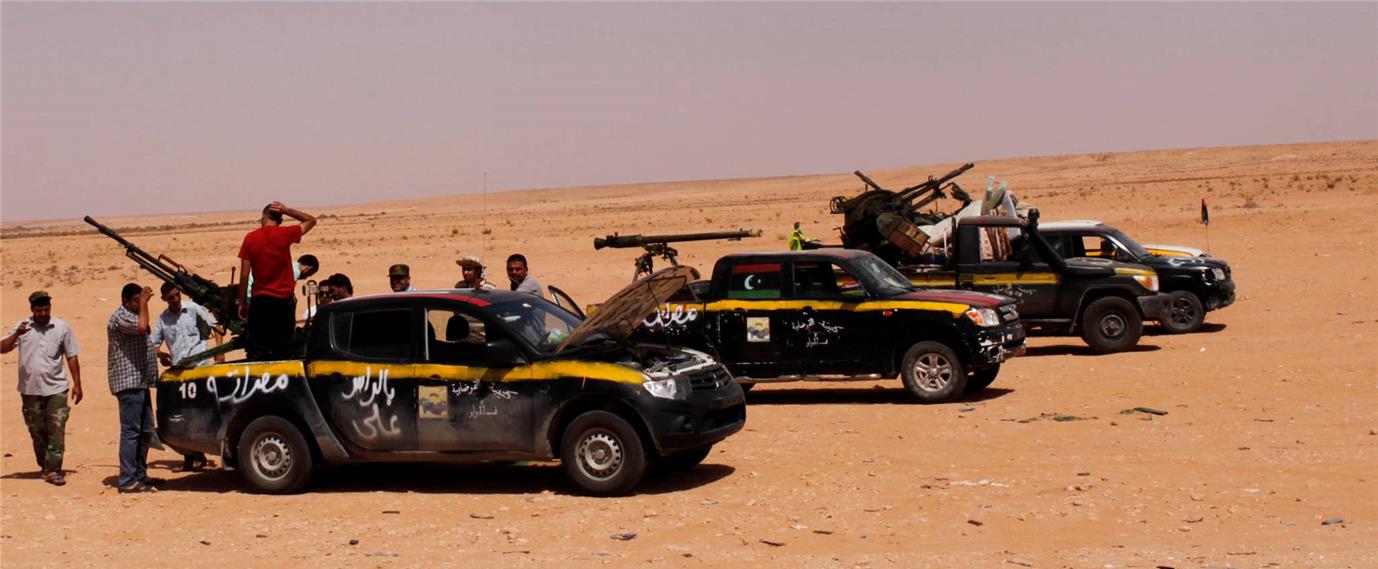بعد امتلاك بعض النصائح والمهارات الأساسية لإعداد خطة محكَمَة لتغطية صحفية، وحديثنا عن "الأمن الشخصي في مناطق النزاع واختيار وتأمين مقر الإقامة خارج أرض المهمة في القاعدة صِفر"، والخوض في قواعد "السفر في مناطق النزاع"، سنتحدث اليوم عن "التعامل مع نقاط التفتيش المنتشرة على طريق الرحلة نحو أرض المَهمة"، لابد من التذكير أيضاً بأن قراءة هذه المقالات لا تُغنيِ بأي شكلٍ من الأشكال عن الخضوع لدورات مباشرة في السلامة المهنية، بإمكانِك الاتصال بأقرب نقابة صحفية لك أو التواصل مع المؤسسات ذات الصِلة بما فيها مؤسسة "الجزيرة".
نقاط التفتيش
في البلاد التي تشهد اضطرابات أو مواجهات عسكرية غير ثابتة الجغرافية، تكون فيها السيطرة على الأماكن مُنتَقِلة من فصيلٍ إلى آخر أو من كتيبة إلى أخرى، هكذا يغدو الانتقال بين مُدُن ملتهبة كالسير في حقل من الألغام، هنا تكمن أهمية عملية تحديث المعلومات التي يجريها الصحفي ضمن آلية مُنضَبِطة خلال مسيرِهِ نحو تنفيذ المهمة.
الحواجز، نقاط التفتيش أو السيطرة التي تفرضها القوات العسكرية أيّاً كان انتماؤها هي عقبة أمام الصحفيين عموماً في المهمات التي تتطلب العبور بها خلال الأوقات غير الطبيعية، لذلك ينصح دائماً بمحاولة إيجاد طُرُق بديلة عن الممرات التي تنتشر فيها قوات متعددة، ذلك يعود لعدة أسباب أهمها:
القوات الحكومية أو غير الحكومية تتواجد في المنطقة لأسباب غالباً تخصُّها بالدرجة الأولى وليس لفرض الأمن، و من الشائع أيضاً في بلدان يغيب عنها الأمن أن تقوم عصابات من المهرِّبين أو قطاع الطرق والمجرمين بنصب كمائن بهدف ابتزاز العابرين، هذه القوات غالباً ما تتبع مبدأ الرشوة أو تقوم باعتقالات عشوائية خاصة إذا كان الحاجز في منطقة تشهد اضطرابات دائمة وتغيُّر في موازين القوى، تذكَّر أن التواجد في منطقة تتمركز فيها قوات مهما كانت الراية التي ترفعها، هو تواجد يسبب لكَ خطورة إضافية لأن هذه القوات بطبيعة الحال هي هدَف ثابت لقوات أخرى، لذلك حاول ما استطعت عدم المرور منها سواء بالانحراف عن مكانها الجغرافي أو العودة دون أن ينتبه الجنود أو المقاتلون لالتفافِك.
لا مجال للهرب
في حال وجدتَ نفسك والفريق معك أمام نقطة تفتيش ولا مجال للهرب، أُطلُب من فريقِك الهدوء التام والالتزام الكامل بكل الأوامر التي تصدر، غالباً ما يحمل الجنود أو المقاتلين استعداداً فطرياً للتحرش بالصحفيين على وجه الخصوص، هذا نابع من موقف مسبق لا علاقة لكَ أنت به مطلقاً، إذا وقع ذلك ووجدت نفسك أمام نقطة تفتيش، قيِّم الحاجز بشكلٍ سريع، عدد الجنود، العلَم المرفوع، حالتهم البدنية، نسبة التوتر والسُكر بينهم، الأسلحة التي يحملونها، كل هذه أمور يجب ألا تفوتك وعليك أن تجريها بعملية ذهنية لا تستغرق أكثر من دقيقتين من وصولك للحاجز، لا تقلق فأنت تحمل أوراقا طبق الأصل عن أوراقك الأصلية المحفوظة في نقطة الانطلاق صِفر، والسيارة التي تستقلها سيارة مدنية ولا تحمل أي اشارة لمؤسستك الإعلامية أو أي علامة دينية أو سياسية، لذلك أخفِض الأضواء العالية للسيارة، خفف السرعة وأبق غيار المحرك على وضعية الحركة 1 أو 2، ولا تتوقف إلا اذا أُشيرَ لكَ بذلك، انزَع نظارَتَك الشمسية إن كنتَ ترتديها واطلب من أعضاء الفريق ذلك، افتح النوافذ واجعل يدَيك في مكان ظاهر للعساكر أو المقاتلين، حاوِل ألا يبدو عليك أي رد فِعل بالمطلق، لا تبتسم ولا تعبس بوجه من يقف على الحاجز، حافظ على الأبواب مُغلَقة حتى يأتيك أمر بالنزول من السيارة، إذا عبَرت بشكل آمِن فتابع سرعتَك الطبيعية، وإذا طُلِب منك التوقف على السيارة التي تقف خلفَك أن تراقِب ما يحدُث معكَ في حال كان المسير ضمن قافلة.
ماذا يُمكِن أن يُطلَب منك عند نقطة التفتيش؟ فور توقفك سيُطلَب منك بطاقات التعريف أو الهويات، فور معرفتهم بأنك صحفي سيطلبون منك تصريح التصوير، حاول ألا تبرز التصريح إذا كان صادراً من جهة تعادي الجهة التي يتبع لها الحاجز، ابحث سريعاً عن مبرر لعدم تواجد التصريح معك وادفع بأحد مساعديك المحليين للتفاهم مع القوة الموجودة فهو غالباً يستطيع إيجاد ثغرات أو أبواب يمكن الولوج منها لهم في حال التعنُّت، سيُطلَب منك أيضاً فتح غطاء السيارة والصندوق الخلفي وأماكن الأمتعة والحقائب الشخصية الصغيرة، التزِم بكل ما يقال لك ولا تُبدِ أي رد فعل حتى ينتهي التفتيش.
ماذا يمكن أن يحدث لكَ عند التفتيش؟، يمكن أن تُقتَل، تُعتَقَل، تُصاب، تُختطف بهدف الفدية، مصادرة المعدات والسيارة، سرقة الأموال، لذلك لا تعرِض أي شيء قبل أن يتم الحديث معك ولا تقُم بأي مبادرة، وفي حال طلب أعضاء الحاجز سجائر أو ماء أو طعام، لا تتردد بأن تقدِّم لهم ما تحمله، لأنَّهُم ببساطة يستطيعون أخذه بمنطق القوة.
حاجز عدائي
تذكَّر أنَّ أي سيارة أو معدات أو مقتنيات ثمينة أو مبلغ مالي لا يعادل حياتَك، لذلك لا تتردد في التنازل عن كل ما يُطلَب منك دون أن تقاوم، لا تفعَل ذلك وأنت تُظهِر جلافة أو غضبا أو حركات مفاجئة، فذلك يزيد من نسبة تعرضك جسدياً للخطر.
في حال توقَّفت عند الحاجز، لا تغادر السيارة إلا حين يُطلَب منكَ ذلك، ولا تحمل بيديكَ أي شيء حتى حقيبتك الصغيرة، لا تبدأ أنت بالمبادرة كأن تخرج من السيارة أو تُقدِّم المفاتيح أو الهويات لهم، لا تجرب أي حديث جانبي مع أي من أعضاء فريقِك، ولا تستخدم الهاتف أو جهاز الاتصال اللاسلكي، ولا تدخِّن أو تأكل شيئاً إلا بعد أن يأذنوا لك، والأهم من هذا ألا تبدُ متوتراً أو متذمِّراً أو تسأل عن الوقت الذي ستقف فيه على الحاجز.
إذا تم العبور بعد انتهاء التفتيش، أعد أمتعتَك بهدوء ولا تتفقَّدها أمام أعضاء الكمين إلا إذا طلبوا منك ذلك، لا تتبادل الضحكات أو الابتسام مع أعضاء فريقك، قُد سيارتَك وتابع طريقَك نحو نقطة ارتكاز قريبة وتفقَّد أمتعتك والسيارة معاً، حينها أنت في أمان مؤقَّت.
في حال تأكَّدتَ قبل الوصول إلى الحاجز أنَّهُ عدائي ويتبَع لجهة لها ماض مؤلم مع الصحفيين، كحلٍّ نهائي وأخير قم بقيادة السيارة بهدوء حتى قبل الوصول بما يقارب 100 متر من الحاجز ثم انطلق بسرعة كبيرة واطلب من فريقك الانخفاض أسفل الكراسي وانخفِض بجسمِك أنت أيضاً باتجاه المقوَد بعد إغلاق النوافذ جميعاً، فقد تتعرض لإطلاق نار، في هذه المواقف الحفاظ على رباطة الجأش والعزيمة القوية تعادل النجاة بحياتِك وحياة الآخرين.








































